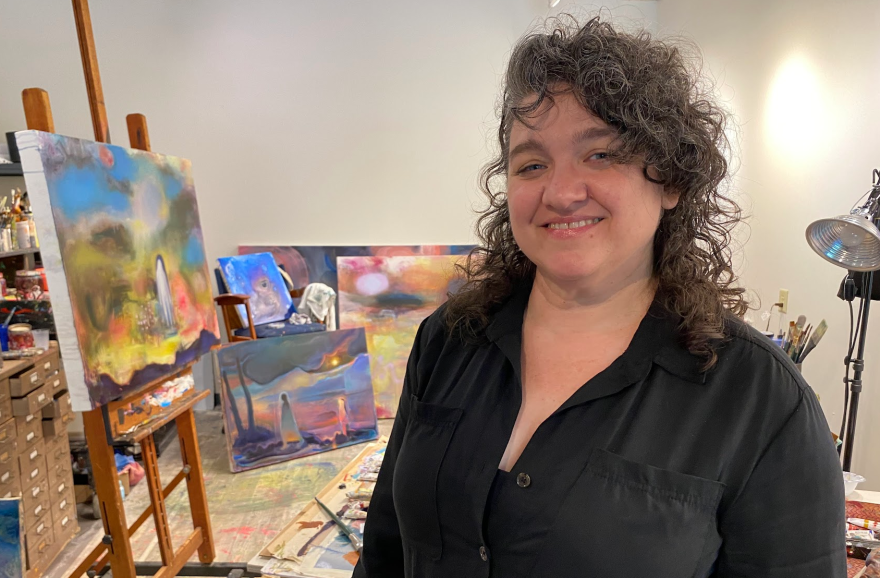It’s a Sunday in late May, and Mira Gerard is both greeting and grieving. She’s welcoming visitors on the final day of her father’s gallery.
“I’m Mira, I’m Jonas’ daughter, so if you have any questions ...”
“Nice to meet you,” a visitor tells her. “Every day, I say: ‘You gotta go one more time.’”
Over the past 15 years, Jonas Gerard’s galleries and studio were anchor destinations in the River Arts District. When he died in 2020, he passed on to his only child a lease on a large gallery and, directly above it, an expansive studio. Mira Gerard also inherited a prolific, lucrative and blemished legacy.
Over the final years of his active painting life, Jonas Gerard faced allegations of sexual misconduct and impropriety from several people who had worked for him. He settled out of court with one of his accusers. Today, two months after shutting the doors of her father’s gallery, Mira Gerard is conscious of that history as she rebrands the gallery with an emphasis on women and queer artists, along with artists of color.
“He was my father and I loved him, and I also recognize his flaws,” Mira Gerard said. “I’m my own artist and my own person, and so I hope people can recognize that and that we can all move forward.”
For Mira Gerard, a milestone in moving forward happens Aug. 19, when she reopens the gallery as Tyger Tyger. Gerard drew the name from a William Blake poem. The rebranding goes beyond the awning. Mira Gerard said she’s excited to find and exhibit work from a variety of artists.
"It just started, more like a question in my mind: What would it be like if this was my gallery, now that it is?” she said. “What would I do to this space if I was in control of it, if it was no longer Jonas Gerard Fine Art?”
Along with a rebranded gallery, Gerard also has an artistic practice that contrasts that of her father. For one, she doesn’t engage in performative painting. Her father regularly invited adoring fans into his studio to watch his abstract whimsy in action. Mira’s work is more quiet, moody, introspective, like snapshots of opaque memory.
“I got over my youthful desire to be a famous artist,” she said. “I realized all I ever really wanted was to make paintings I could feel proud of.”
Mira Gerard is an art professor at East Tennessee State University and lives in Johnson City. She began spending more time in Asheville as her father’s health worsened. More than once, she said, her father asked if she would consider taking over the gallery once he’s gone.
"I had been so resolutely, nope, that’s not me, that’s not the career I’ve created,” she said. “I’m an art professor, that’s my job, that’s what I do, and I’m a painter.”
Gerard was surrounded by the arts from birth. She grew up without a television on an ashram in New Hampshire and said her childhood was both idyllic and distressing.
"I was very spoiled. I got whatever I wanted. My father did probably dozens of paintings of me. I was always being painted, “ she recalled. "But there was a degree of emotional neglect that I just didn’t understand, that my parents didn’t intentionally hoist upon me, but it’s taken me a lifetime to unpack it.”
After her parents divorced, her father became a popular street artist in New York and, later, opened his first gallery in Ft. Lauderdale. Her mother developed a successful jewelry practice in Tennessee. Mira Gerard initially wanted to become an actress, but discovered feminist art in college, left the stage and studied painting.
She said any remnants of the religious practice she carried from the ashram fell away as an adult through both her artistic practice and psychoanalysis. But even after acquiring tenure and chairing the art department at East Tennessee State, Gerard said waves of depression regularly washed over her. She said that, over the years, her art has reflected both her descent into and emergence from depression.
“I remember being like ‘I have all the things I thought I wanted. I’m married. I have kids. I’ve got the dream job. And I’m so unhappy,’” Gerard said, noting she hasn’t suffered a depressive bout in over a dozen years.
While Gerard plans to be in Asheville as often as she can, her partner and others she has hired will run Tyger Tyger day to day while she teaches in Johnson City.
"I know from my conversations with papa that he would 1000 percent endorse what I’m doing,” she said, adding that he was generous with his praise and encouragement regarding her art. “It was extremely important to him that I do what I felt I wanted to do. He didn’t tell me how I should or shouldn’t be an artist.”
NOTE: Tyger Tyger is a sponsor of Blue Ridge Public Radio.







